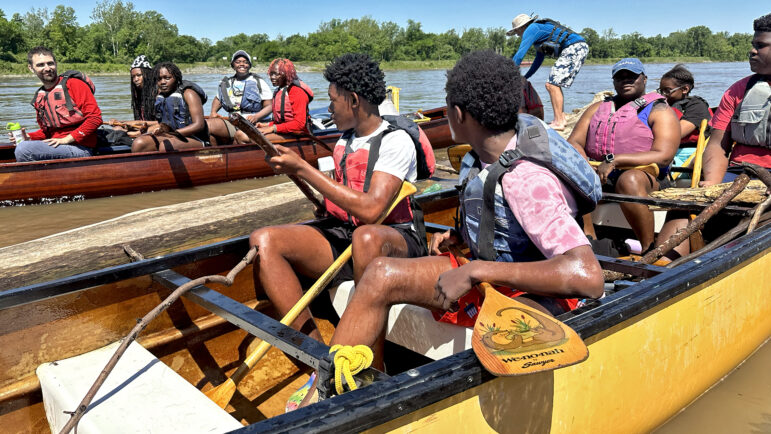On a Saturday morning in May, nearly two dozen kids fill three canoes and set out on the mighty Mississippi River near Helena, Arkansas. They’re building new memories in the canoes, yelling chants and singing Mariah Carey songs. Jade Stokes, 17, helps paddle as the sun shines overhead.
“I want to come every time,” she said. “I’ll just complain every time, but I still like it. I just forget how hot it [can] be. I think about this part, not about the canoeing part.”
Being out on the Mississippi is like an escape, Stokes said — away from the city and all the other distractions in her life.
“My phone barely works out here, so I’m not on [it]. Just them and water and fruit. It’s like taking me away from the actual world,” Stokes said.
In one of their chants, Stokes and her companions refer to themselves as “Mighty Quapaws” — named after the company leading them down the river — Quapaw Canoe Company. The business is named to honor the Native American tribe whose ancestral homelands were along the Mississippi River before the U.S. government forced them out of their territories.
Quapaw Canoe Company is a business, offering guided tours and multi-day trips down the Mississippi. But part of its goal is to teach kids to respect the river.
One way it accomplishes this is through partnering with after-school programs to take younger people on trips.
Clarksdale, where the company’s main base of operation is in Mississippi, is a predominantly Black community, so getting people involved also means helping expose youth of color to the great outdoors.
Jadarius Carter, now 17, was 11 when he took his first trip with the canoe company. On this Saturday, he and the other young explorers are here with Spring Initiative, an after-school program that’s also based in Clarksdale.
“I was kind of scared. I thought I was going to die because I didn’t know how to swim yet,” Carter said. “Then I started actually coming on more canoe trips and liked being on the river. I ended up liking nature.”
John Ruskey started Quapaw Canoe Company 25 years ago. In that time, they’ve grown to have locations in Memphis, Tennessee, and Vicksburg, Mississippi, and currently have about a dozen river guides. They’ve completed thousands of wilderness expeditions by canoe, kayak or paddle board along the lower Mississippi River.
“We’re creating a culture of Clarksdale youth who have fun in a place that they’ve been told to fear their whole life,” Ruskey said.
Ruskey said with climate change and more extreme weather events, it’s becoming important for everyone to learn to do a better job of taking care of the environment.
“The kids that we’re taking out in the water today will become the next generation of adults who are living there and making decisions about this great waterway and all of its wild and wonderful beauty,” Ruskey said.
A strategy they’ve used to continue influencing local youth is by taking on apprentices, where they teach kids outdoor skills, such as how to build canoes and be a river guide.
Valencia Metcalf, now 26, is a former apprentice who worked with the Quapaw Canoe Company for 5 years. Metcalf’s interest in the river started with her after-school program, Griot Arts, another nonprofit in Clarksdale that partners with the company.
Like the Spring Initiative, Griot Arts aims to expose younger people to new experiences by taking them on trips down the Mississippi River.
Growing up, Metcalf was used to hearing negative things about the Mississippi River.
“People were always saying [that] a lot of people die [on] the Mississippi River,” she said. “Or there’s monsters down there or… it’s too much water.”
But Metcalf fell in love the first time she got on the water and asked Ruskey how she could get involved outside her after-school program — leading to her apprenticeship. She said canoeing taught her not to be scared of the river and to appreciate nature more.
“I know water can’t talk but just sitting out there … it used to make me so emotional,” she said. “I felt like nature was speaking to me.”
Metcalf credits Ruskey and Mark “River” Peoples — who she said basically trained her, taught her about the river and showed her how to be a guide. She moved from guiding the small canoes to the larger ones, and she also helped around the shop — like carving some canoes used on the river. She eventually taught other kids how to paddle.
In 2019, Metcalf had to step away from her apprenticeship because her doctor advised her to refrain from lifting heavy objects.
“I miss being in the back of the canoe, holding the paddle and going downstream with the wind blowing to my face,” Metcalf said. “That’s the best feeling.”
She still thinks about Quapaw and the river in small ways — like not littering — because the company taught her how, in nature, everything is connected and can impact the river.
“Everything that goes on the ground, if you don’t throw it away, it goes to the river and it affects the people drinking water and it affects the fish living in water and everything,” Metcalf said.
This story was produced by the Gulf States Newsroom, a collaboration between Mississippi Public Broadcasting, WBHM in Alabama, WWNO and WRKF in Louisiana and NPR.

